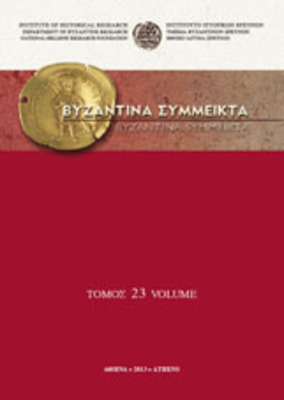The Notion of δῆμος and its Role in Byzantium during the Last Centuries (13th-15th c.)
Part of : Βυζαντινά Σύμμεικτα ; Vol.22, No.1, 2012, pages 101-124
Issue:
Pages:
101-124
Section Title:
ιστορική ανάλυση
Abstract:
The notion of demos/δῆμοι (people/circus factions) has been a favorite subject in modern research and various opinions have been formulated regarding to its organization and the role it played in political developments. In modern bibliography referred to the period with which we are concerned (13th-15th c.) the term δῆμος denotes generally the lower strata of the urban population, that is, small merchants, artisans and various laborers. However, through the systematic study of that period’s sources certain nuances can be detected in the meaning of the term δῆμος, which, apart from the lower social stratum, also seems to include the middle social class and moreover denotes a larger group that contains both the lower and the middle social stratum. This paper examines the concept of δῆμος and similar expressions, the social composition of this body and its role in the political life of the era, based on the sources of the late Byzantine period (13th-15th c.). The presence of the δῆμος in the sources of the period under study is not simply a re-use of the classical term derived from ancient literature but is related to the reorganization of the capital after its recapture in 1261, and more precisely to the organization of the city’s districts under the leadership of δήμαρχοι. The people in the provincial cities were also expressed in the sources after the reconquest of Constantinople with the term δῆμος. The δῆμος is also connected to the rise of the middle social class, which is subsumed in its notion. During these years the δῆμος was a not homogeneous broad social body, which included members of both the middle and the lower social stratum. It is obvious that, while representing the δῆμος in the collective bodies, the members of the middle social stratum were making their own demands. General terms such as λαός, οἰκήτορες, πολῖται, πολιτεία, ἔποικοι seem to have in many cases a similar meaning to that of δῆμος. Until the fall of the empire the δῆμος did not seem to act as an independent political authority which was regularly taken into account in decision making. Nevertheless, the organization and political action of the δῆμος especially through assemblies and uprisings, which are related to the general political developments of the era, indicate that its role in the decision-making policies was in certain cases decisive
Subject:
Subject (LC):
Keywords:
βυζαντινή κοινωνία, βυζαντινοί θεσμοί, Κωνσταντινούπολη, επαρχιακές πόλεις, αυτοκρατορία Νίκαιας, παλαιολόγεια περίοδος, ιστορικά κείμενα, λογοτεχνικά κείμενα, αρχεία μοναστηριών
Notes:
Αιώνες: 13ος - 15ος, 856:https://ejournals.epublishing.ekt.gr/index.php/bz/article/view/3787, DOI: https://doi.org/10.12681/byzsym.1054, Τα keywords δεν υπάρχουν στο πρωτότυπο τεκμήριο
Electronic Resources:




